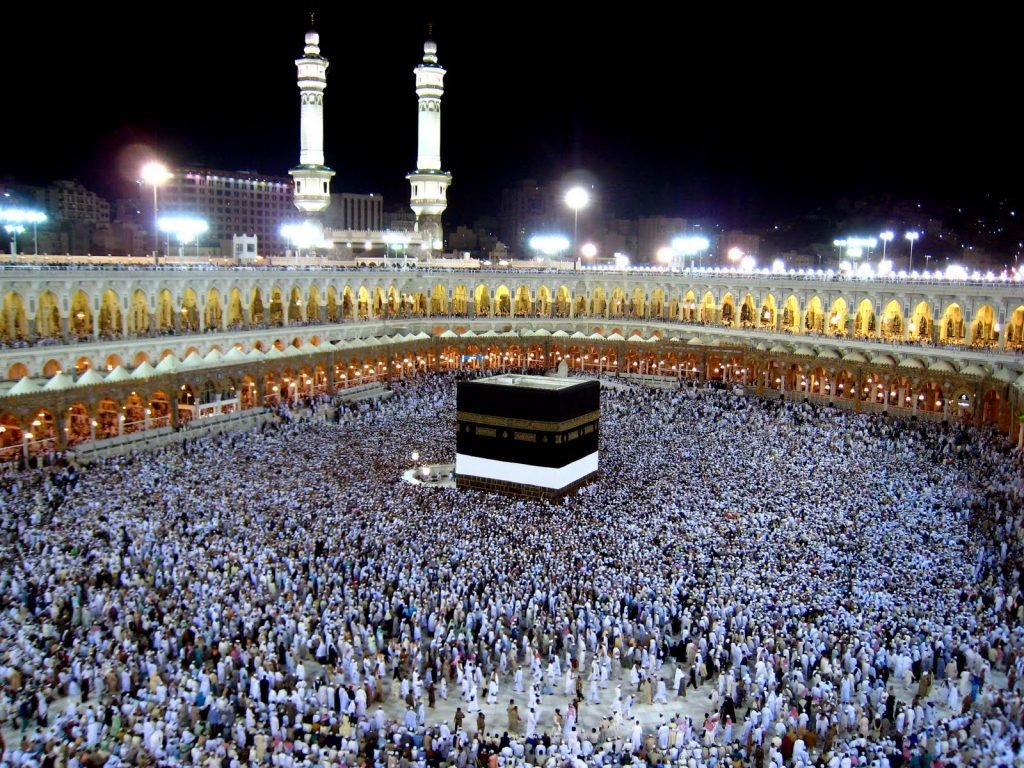Hajj
Hajj | Umrah
Hajj, also known as pilgrimage to Mecca, is one of the five pillars of Islam. It is distinct from visiting the shrines of saints or monasteries for holy men or miracle sites, despite some Muslims undertaking those visits. Hajj is performed at the Kaaba, located in the sacred city of Mecca in Saudi Arabia, which is known as the “House of God” and was built by Prophet Abraham for the worship of Allah. Muslims face the Kaaba during their prayers (salah), and the Hajj rituals are performed exactly as Abraham and Prophet Muhammad did.
The pilgrimage is viewed as a highly meritorious activity, serving as penance, forgiveness for sins, and an opportunity for intense spiritual devotion. It is required of all physically and financially capable Muslims to undertake the pilgrimage to Mecca once in their lifetime. The pilgrimage begins a few months after Ramadan, on the 8th day of the last month of the Islamic year, Dhul-Hijjah, and ends on the 13th day. Mecca is the center where Muslims converge once a year, where they meet and refresh their faith, recognizing that all Muslims are equal and deserving of love and sympathy, regardless of race or ethnicity.
Hajj fosters racial harmony, as illustrated by Malcolm X’s experience on his historic pilgrimage. The pilgrims dress uniformly in simple garments, calling out “Labbayka! (Allahumma) Labbayka!” (At your service, O Lord!), emphasizing their devotion to Allah rather than their social status or wealth. People of different races and ethnicities come together, recognizing their shared brotherhood and equality in the eyes of Allah. Malcolm X experienced a profound change in his outlook toward “white men” as he saw the genuine brotherhood that existed among Muslims of all complexions during Hajj.

Importance of Hajj
Hajj is the fifth pillar of Islam, and it is an obligatory act of worship for all Muslims who are physically and financially capable of performing it. It is a once-in-a-lifetime pilgrimage to the holy city of Mecca in Saudi Arabia, and it is a significant religious practice in Islam. The importance of Hajj in Islam can be seen in several ways:
- Obedience to Allah: Hajj is an act of obedience to Allah, and it is a way of demonstrating one’s submission to Allah’s commands.
- Unity of Muslims: Hajj brings Muslims from all over the world together in one place, and it promotes a sense of unity and brotherhood among Muslims.
- Spiritual Renewal: Hajj is an opportunity for spiritual renewal and a chance to seek forgiveness for one’s sins. It is a time when Muslims can focus on their relationship with Allah and recommit themselves to their faith.
- Remembrance of Prophet Ibrahim (AS): Hajj is a reminder of the trials and sacrifices of Prophet Ibrahim (AS) and his family. Muslims perform many of the same rituals that Ibrahim (AS) and his family performed, such as the stoning of the devil, sacrificing an animal, and walking between the hills of Safa and Marwa.
- Forgiveness of Sins: Hajj is considered a means of attaining forgiveness of sins and a way of earning Allah’s mercy and blessings.
Overall, Hajj is an important pillar of Islam that holds great significance for Muslims. It is a time when Muslims can come together to worship Allah and seek His forgiveness and blessings.
Significance of Hajj
Hajj is one of the five pillars of Islam and is considered one of the most significant religious duties for Muslims. It is an annual pilgrimage to the holy city of Mecca in Saudi Arabia and is obligatory for all able-bodied Muslims who can afford to make the journey.
The significance of Hajj is multifaceted. It is a symbolic journey that represents the unity of Muslims around the world, regardless of their ethnicity, race, or social status. It is also an opportunity for Muslims to reflect on their faith, seek forgiveness for their sins, and renew their commitment to Islam. The rituals performed during Hajj are believed to bring spiritual cleansing and closeness to Allah (God).
Hajj also has historical and cultural significance. It is the same pilgrimage that was performed by Prophet Muhammad (peace be upon him) and his followers more than 1,400 years ago. The rituals of Hajj also commemorate the actions of Prophet Abraham and his family.
Furthermore, Hajj is a chance for Muslims to connect with their global community, meet fellow believers from different parts of the world, and exchange experiences and ideas. It is a celebration of diversity and a reminder of the power of unity in faith.
In summary, the significance of Hajj is both spiritual and cultural, and it serves as a unifying force for the Muslim community worldwide.
